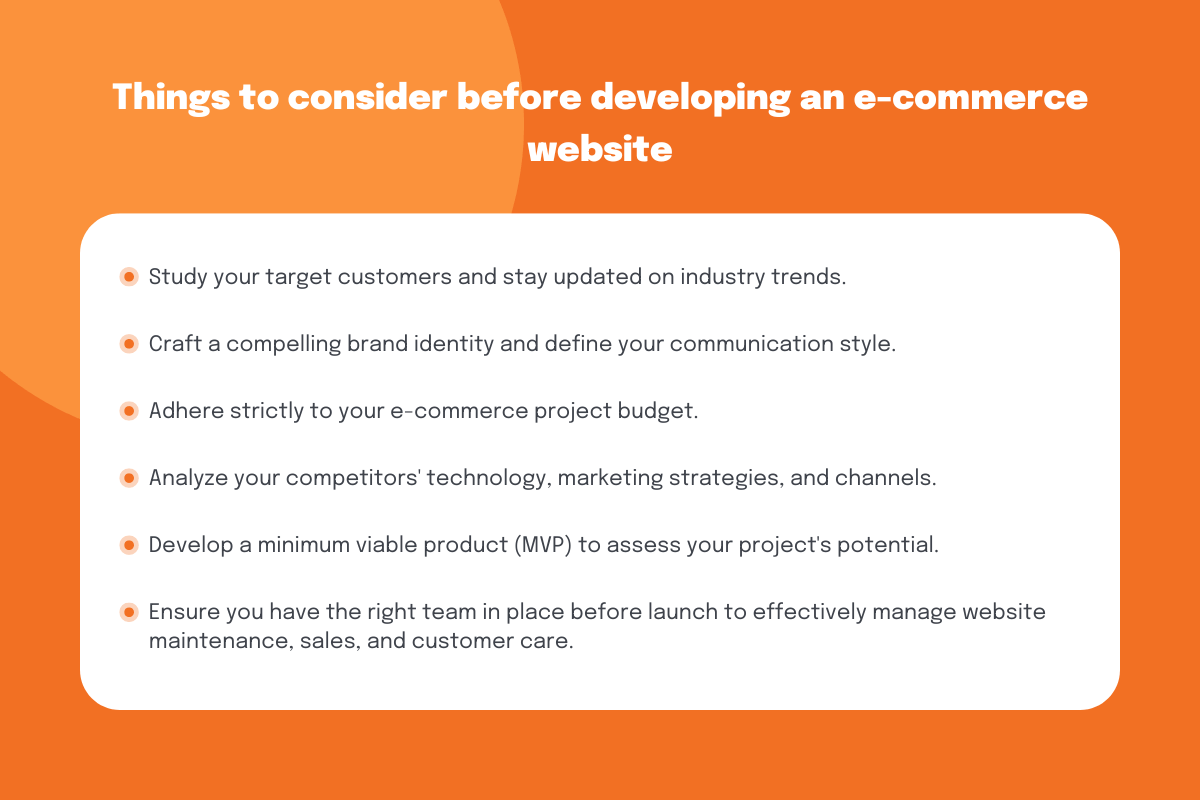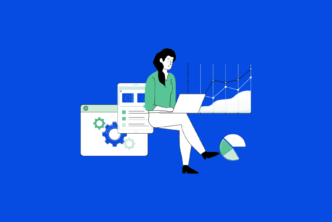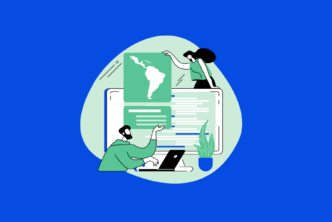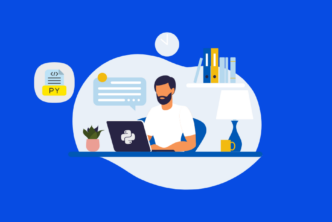Table of Contents
An ultimate guide to the online retail and e-commerce industry
The impact of COVID-19 on the e-commerce industry
E-commerce websites have become very helpful, keeping in mind the current post-pandemic state of the world. The total retail sales increased 6.1% in 2022, while online spending represented almost 14.6% of growth. That has made e-commerce website development more vital. In 2023, even due to inflation, US consumers are expected to spend $54 trillion dollars on transactions.
Based on data published by Digital Commerce 360, online expenditure grew by $1.03 trillion in 2022 compared to the same period in 2021 ($960.44 billion). In the fourth quarter of 2022, online spending accounted for 6.2%, which is the highest level in history ($299.12 billion), compared to the same period last year ($281.58 billion)
Overall, COVID-19 had a massive impact on both online businesses and how consumers shop online.
The current state of the e-commerce market
The number of online stores and e-commerce websites worldwide grew by 7.1% in 2022—some exciting trends have been noted. The use of videos for marketing and sales is increasing, for example, with brands leveraging video content to engage users, boost brand awareness, and influence buying decisions through designated newsletter platforms. Online stores have also employed augmented reality (AR) technologies for better deals and more advanced e-commerce website designs.
Furthermore, sellers are now turning towards platforms such as Amazon, with consumers spending an average of $1.29 billion per day. Therefore, it is no surprise that entrepreneurs are starting to build their ecommerce stores on Amazon like 1.9 million other online business owners.
The most popular e-commerce platforms in 2024
There is an overwhelming increase in the number of e-commerce platforms available in the market. With a simple Google search, you can find some of the best online shopping tools, website templates, and e-commerce website builders to help you with website development. The following are the best e-commerce platforms in 2024:
- Shopify: This is one of the most prominent e-commerce solutions out there. Shopify is spread in over 175 countries, with over 1 million business clients. It is best suited for small to medium businesses, and it has various features integrated into the platform, making it very easy to use. It has diverse custom domains, AI personalization, more than 70 user-friendly templates, image optimization algorithms, many other features, and excellent support. There are hundreds of multi-purpose Shopify themes available on Shopify’s official theme store, but if you don’t see the needed option here, look for alternatives on various third-party sites. If you want to see to it that your Shopify store is accessible to people with disabilities, you will need to use a Shopify accessibility app.
- Magento: This is one of the most well-known open-source e-commerce platforms. It was initially released in 2009 and has since been providing services in many countries. It is well suited for small to medium businesses with the required human resources and time to set up their website. The various features that make it so reliable include global selling, optimization for mobile shopping, instant purchase, video options available for e-commerce customization, and Magento support and maintenance service.
- WooCommerce: When you think of e-commerce platforms, WooCommerce is what comes to mind. Not only is it open-source, it also offers a free shopping cart plugin. Over 30% of all online stores use WooCommerce hosting. It is crucial for small businesses with WordPress sites but who are working with a limited budget. The third-party plugins and user-friendly WooCommerce themes make this platform extremely flexible. It has various features, including shipping options, a calculator, geolocation support, mobile optimization, coupons, and discounts. You can always expand the functionality by using external tools such as shipping tracking software, dropshipping software, or other helpful logistical software solutions.
- Drupal: This is an open-source and free e-platform that helps you perform various website functions. It has flexible features that help to customize an e-commerce store according to its customers’ wishes. It is best suited for small companies with relatively tight budgets. It is an accessible and secure platform. As an additional benefit, there are many Drupal hosting platforms to scale operations.
- BigCommerce: This platform was founded in 2009 and now has clients in 120 countries. BigCommerce is best suited for small and mid-sized businesses (SMBs) requiring their online platform to perform various functions. Although it is slightly costlier than the other platforms, it is loaded with multiple features, including gift cards, limitless bandwidth and product listings, custom domains, lots of themes, and e-Commerce templates.
- OpenCart: This platform offers everything you need to run an online store. It is open-source software that can be added to your existing website. It has various modules, extensions, and themes that help you customize your website’s look and feel. It also has excellent assistance from the different registered members as well as paid technical support.
- 3dcart: This is an all-in-one software that helps you develop as an entrepreneur. It comes with several exciting features that make it incredibly user-friendly. Not only is it secured with two-factor authentication and various anti-fraud tools, but it is also a scalable platform that you can use to build your website.
The benefits of custom e-commerce development services
What is custom development?
Custom software development is the process of designing, creating, deploying, and maintaining software for a specific set of users, functions, or organizations. In contrast to commercial off-the-shelf software (COTS), custom software development aims at a narrowly defined set of requirements.
Benefits of custom e-commerce development services
An off-the-shelf e-commerce product may sometimes seem highly lucrative as it is easy to handle and very affordable. However, people do not seem to understand that a generic product can cost more money in the future. The advantages of custom e-commerce software development include:
- Improvement in the Bounce Rate and Conversions: With a customized e-commerce service, that deploys an effective customer engagement model, you can better satisfy your customers, leading them to spend more time on your websites, ultimately resulting in a low bounce rate, more conversions, and increased customer loyalty.
- Better Search Engine Optimization: An off-the-shelf e-commerce product is produced for the masses and hence only has generic SEO features that are not geared towards a particular company or business. With a customized product, you can expertly handle your search engine optimization needs and other digital marketing parameters specifically for your industry.
- Handling Unique Processes: When a customer uses an e-commerce platform, they might come across various front-end and back-end requirements in the form of checkout, payment options, customer support, and more. One may need vetting before buying a product, and the other may need the credits checked before a large transaction, which is possible with a custom e-commerce website.
- Integration with your Business: The e-commerce platform may need to integrate your business model and e-commerce marketing strategy for optimal operation. It is possible only with a custom e-commerce platform and not with an off-the-shelf product.
- Build an attractive appearance: You can customize the look and feel of your e-commerce site with features such as high-quality images, an exemplary user interface, and a seamless checkout process by adding user interface design icons and buttons available in a variety of colors and shapes. This will improve your e-shop’s user experience, especially if you use a UX research tool to make sure your users’ UI expectations are fully satisfied. You can also add beautiful images to your products and make them look attractive, and even create digital catalogs to showcase your products.
- Get Easy Updates: Old technology on your e-commerce site can bring it down. With a customized e-commerce site, you can update to the latest technology providing your customers with better performance and functionality.
Things to consider before developing an e-commerce website
- Research your business industry well: Before you begin with the e-commerce web development process, one of the most important things you have to conduct is a thorough analysis and research of your business industry. You must understand the various loopholes and take into consideration the target customers for your industry. Delve deep into their preferences, age, and other factors that will help you develop product categories, descriptions, payment gateway, product images, lead list and other aspects effectively.
- Attend to the target audience’s needs: Once you understand what you have to sell, it is now vital to prioritize the potential customers while having a thorough sales intelligence. How do you do this? You have to understand their culture, geography, demography, and purchasing inclinations. The best thing is to develop an engaging feedback form and collect feedback from them directly using effective customer feedback collection tools. That will allow you to create a set of appropriate responses that will, in turn, help you design your e-commerce business.
- Determine your branding and plan a content strategy: Without proper branding and content strategy, you will never be able to reach out to a plethora of people. Think about all the successful companies such as Amazon and their brilliant logos, product details, product reviews, product videos, visual images, emotional connotations, and wish lists. Similarly, it would be best if you now considered these aspects, such as building a remarkable logo, choosing the voice for your company, and establishing a strategy for growth and development.
- Mind your e-commerce website development budget: It is always easy to go overboard with your finances, especially in the developmental stages of your e-commerce store. However, it’s imperative to be very cautious about staying within the stipulated budget and employing strategies to help you do so. It is always advisable to revise your budget every time you make a fiscal decision.
- Bear in mind the competition: Being a successful business is all about standing out among your competitors. Hence, you need to analyze their working segments by applying the relevant catchphrases into a browser. Take into consideration the various promotional tools and features employed by other business owners to attract customers. Are they using social media, e-commerce email marketing, or something else? How do they design their product pages? More importantly, you must also pay attention to the technical aspect, such as the hosting tool, domain name, content management system, or other add-ons that they are using.
- Create an MVP (minimum viable product): You need to understand that the essential function of an e-commerce store is to sell goods. On the other hand, the goal of an e-commerce MVP is to assess the potential of a particular business to encourage people to buy the goods and services being provided by them. Suppose you aim to create a creative and innovative shopping platform with a high conversion rate, backed by a special algorithm that is set to provide a fantastic user experience and the best products. In that case, you need to take the help of an MVP.
- Train your team. If you want to increase sales and volume, you should have dedicated sales development representatives (SDRs). Before investing in a project, make sure you have the right talent before the launch. Sometimes you might face some challenges with productivity and efficiency in your team. In that case, you should invest in (a) sales process and (b) team training. Here are some best sales blogs that can educate your team and give you perspective on what to adjust in day-to-day operations to perform the best results in e-commerce.
Hire e-commerce developers with YouTeam
How to choose the right e-commerce software stack
When you choose e-commerce software and a tech stack, there are questions about how they integrate into the existing stack, protect customer data and payment security, and ultimately provide a seamless customer experience. In this section, we discuss the aspects that affect the choice of technical stack, hosting provider, payment gateway, and shipping software for custom e-commerce development.
E-commerce tech stack
Examples of common ready-to-use technical stacks for online store development include the LAMP stack (Linux, Apache, MySQL, and PHP), the MEAN stack (MongoDB, Express, Angular, and Node.js), or the Python-Django stack. However, there are unlimited possible combinations of programming languages, frameworks, and database management systems for e-commerce development. Here’s what to consider when choosing the right set of technologies for such projects:
- Ensure its compatibility with the existing stack.
- Check if the technology you are using for the project has a vibrant community and vendor support.
- Make sure you have the experienced talent for your chosen languages and skills.
- Consider time-to-market and scaling options.
- Calculate the budget for software development, hardware updates, web hosting, and 3rd party integrations.
Web hosting service
Consider the type of hosting (shared hosting, VPS, or dedicated server) based on performance, flexibility, and security requirements. You should also read customer reviews and ensure the hosting provider has all the features you need for the initial launch and future scaling. The main points to consider when choosing a hosting provider are:
- The level of security and encryption
- Bandwidth, storage capacity, and scalability
- Automated backups frequency
- Customer support hours and response rate
Payment gateway
First, you need to research which payment systems your users already use. If they cannot make instant payments, they may consider choosing another online store with a similar product range and pricing. Other factors to look for when selecting a payment provider:
- Compatibility with your current tech stack
- Maintaining payment card industry (PCI) compliance to protect customer data and payment information
- Payment provider’s fee structure
- Adaptable checkout experience optimized for various devices
- Recurring billing for subscription-based services
Shipping software
Delivering to many new customers in distant locations requires careful shipping software and logistics platforms analysis. The list of features that may be essential when selecting a shipping platform includes the following:
- Shipping rate comparison across the major carriers
- Ability to print packing slips for error-free order fulfillment
- Tracking and order status notifications
- Managing cash-on-delivery orders (COD)
- Managing returned products
- International shipping support
Why should you outsource custom e-commerce website development?
The main reasons are as follows:
- Cost efficiency: The primary reason why most startups seem to fail is because of budget issues. However, with the help of an outsourcing development company, you will not need to exhaust your funds in making overhead payments such as payroll and rent. Hence you will be able to save money by hiring offshore developers.
- Access to global professionals and the latest technology: For e-commerce website development, you will be in dire need of challenges and technology. You will acquire some of the best developers worldwide who will add much to your startup.
- Greater focus on core business processes: When you do not have to pay for overhead, you automatically have more money to spend on other things. Offshore developers also charge less, which helps save even more.
- Increased productivity and saved time: While it is possible to save money with offshore developers, you’ll also be able to enjoy increased productivity. You will not have to spend time training to develop skills as these developers are already experts in their area.
- Flexibility: As a budding company, it is imperative to scale the team with the new surge of technology within a short period. That, however, is not possible with an in-house team. Outsourcing developers will help you create greater flexibility in your company.
What can influence your e-commerce website development budget?
Based on the budget, you may decide on the features and design of your website. Do you want to build a custom e-commerce website from scratch, or do you need to improve its security, integrate custom CRM, or add other features? When you have a clear scope of work in your mind, you can predict the time you need for development and the size of the team to work on this task. To estimate website pricing keep in mind these essential points:
- Type of e-commerce website (marketplace, online retailers, single brand.)
- Employment type (in-house, offshore, or nearshore outsourcing, staff augmentation, or freelancing.)
- E-commerce developer rates. Salary rates depend on technology, location, seniority level, English knowledge, years of experience, and employment type.
- UI/UX development.
- Front-end and back-end development and testing.
- Size of the development team.
- The complexity of web architecture. Depending on what eCommerce website architecture you choose, the price may vary. The more complex it is, the higher price will be.
- Website hosting, domain name, SSL certificate, and PCI compliance costs.
- The number of the 3rd party integrations (Stripe, PayPal payment integrations, CRM, contact center integration, social media API, notification and pop-ups integration.)
- SEO optimization. You need to continuously audit the website, including testing load speed and mobile friendliness during and after the web development process. To help with that, you can use SE Ranking, as it has the features required for an in-depth website audit. (Overall cost will vary depending on the size of your website).
- Maintainance. This e-commerce web development service is a well-spent, monthly expense for regular preventative maintenance.
- Development time.
How much does it cost to hire an e-commerce programmer in different countries?
It is not easy to find properly skilled programmers with a range of experience and training at an affordable rate. For example, e-commerce programmers in the US earn about $95,650 per year. At the same time, the average salary of their counterparts in Great Britain, Germany, and France is £42,021 ($50,686.70), €67,012 ($71,595.62), and €65,669 ($70,160.76), respectively.
The only way you can hire a cost-effective e-commerce developer or a dedicated team of employees is by outsourcing them from other parts of the world. According to an article published in Business Insider, the best destinations for outsourcing software developers are the Philippines, China, Vietnam, and Taiwan. For example, the charge for a software developer in Ukraine is about $41 per hour.
The hourly rate of an e-commerce software developer in other regions of the world is as follows:
| Eastern Europe | |
| Czech Republic | $42 |
| Romania | $28 |
| Bulgaria | $41 |
| Ukraine | $39 |
| Poland | $46 |
Source: Glassdoor, Indeed.com
| Latin America | |
| Chile | $48 |
| Uruguay | $26 |
| Bolivia | $21 |
| Colombia | $31 |
| Mexico | $44 |
Source: Glassdoor, Indeed.com
| Asia | |
| Nepal | $26 |
| Bangladesh | $25 |
| Sri Lanka | $21 |
| Philippines | $25 |
Source: Glassdoor, Indeed.com
| Africa | |
| Nigeria | $31 |
| Egypt | $28 |
| Morocco | $23 |
| Kenya | $26 |
Source: Glassdoor, Indeed.com
Cost of hiring senior developers for custom website development by technology
As we have mentioned before, the cost of hiring developers depends on quite a few aspects: employment type, location, experience, and knowledge of programming languages, libraries, and frameworks.
In the table below, we compare the average rates of senior US developers vs. contractors of YouTeam based on technology. Keep in mind that hiring in-house developers will incur additional costs such as taxes, rent payments, electronic devices, bonuses, and benefits.
| The US | Eastern Europe | Latin America | |
| Angular.js | $83 | $55 | $57 |
| Python | $92 | $63 | $63 |
| JavaScript | $86 | $59 | $64 |
| Node.js | $73 | $59 | $60 |
| Ruby On Rails | $94 | $62 | $64 |
| .Net | $76 | $53 | $57 |
| React.js | $85 | $57 | $62 |
| Django | $73 | $62 | $64 |
| C# | $91 | $55 | $69 |
| MongoDB | $89 | $59 | $59 |
| MySQL | $80 | $63 | $55 |
Tips for sourcing and hiring offshore e-commerce developers
For the best e-commerce web design, this is how you can select the best teams:
- Check for their credibility: You need to determine whether the offshore company you are about to hire is trustworthy. You can contact previous clients to get insights into their experiences to make the best choice.
- Clear the air about their workflow: You must ask them questions about how communication is maintained with the client and how developers are allocated to various projects. It is also important to enquire about their flexibility.
- Get access to the latest codes: You must make sure that you always have access to the regulations being generated. It might so happen that the company will not provide you with the codes later because of some personal conflict. Hence it is essential to keep them handy.
- Be interactive: You must show your skills as a founder and work with your offshore team. You mustn’t alienate them.
- Be leery if a company is too inexpensive: Remember you aim to be cost-efficient. If you work with a seemingly “cost-perfect” company and they provide you with a low standard of work, you will need revisions later, which, in turn, costs more.
Advantages of hiring a dedicated e-commerce developer with YouTeam
For the best e-commerce solutions, rely on YouTeam. The following are some reasons why:
- Get a broad selection of software developers: With YouTeam, you get access to a considerable pool of offshore developers with great skills and talent.
- Every engineer is vetted: Vetting is a necessary procedure to ensure that only the best engineers are chosen. There is a multi-stage screening process that helps in handpicking agencies.
- Ability to scale the team: With these offshore teams, you enjoy the flexibility of scaling them according to your startup project.
View projects built by e-commerce software developers from YouTeam’s talent pool.
Since the beginning of the pandemic, there has been an increase in online shoppers. That, in turn, has increased e-commerce sales, which has triggered the need for effective e-commerce solutions. Custom e-commerce website development has numerous benefits, especially when you hire the right offshore team. To get the best website developers to work for you, connect with YouTeam.








